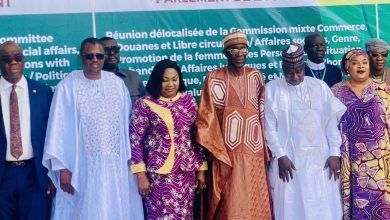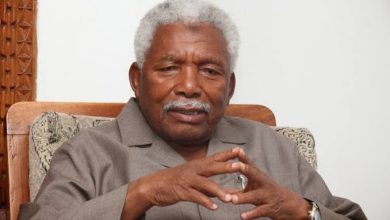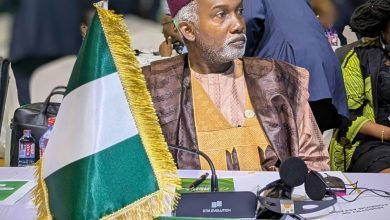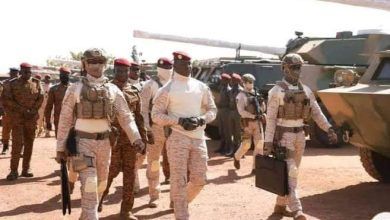Aftican Matters
ECOWAS Laws Must Facilitate Free Movement, Not Hinder Same – Jatta

Speaker of the Gambia National Assembly, Fabakary Tombong Jatta,
has stressed the need for the ECOWAS Laws to facilitate free movement of people across the sub-region borders rather than hinder it.
Jatta made the indication at a delocalised meeting of the joint committees on Social Affairs, Gender and Women Empowerment, Legal Affairs and Human Rights, Political Affairs, Peace, Security and African Peer Review Mechanism (MAEP), Legal and Human Rights, Trade Customs and Free Movement at Banjul, The Gambia, on Monday
He said free movement of persons, rights of residence and establishment are fundamental to the vision of a united peaceful and prosperous community
Jatta heed that the member states must ensure that the national laws are harmonized with regional commitments, provide robust oversight to guarantee compliance, and advocate tirelessly for the rights and welfare of all ECOWAS citizens.
He challenged the parliamentarians to focus on resolutions that will allow member states harmonizing national laws with regional commitments..
This he said, involves reviewing and amending immigration policies, labour laws, and other relevant legislation to align with the provisions of the protocol.
“Our legislative actions must be geared towards creating an enabling environment where the protocol can thrive and deliver on its promises. Equally, we must also recognize the numerous challenges that have impeded the full realization of the protocol. Many of our citizens face significant difficulties when attempting to move across our borders. These challenges range from bureaucratic obstacles and inconsistent immigration policies to issues of national security.
“There is the urgent need to ensure that our laws facilitate, rather than hinder, the movement of people across our borders. Robust oversight on the part of you the Parliamentarians is also essential to guarantee compliance with the protocol.
“We must hold our governments accountable for their commitments and ensure that they are implementing the necessary measures to facilitate free movement of our people across our region.
“The free movement of persons, right of residence, and establishment are fundamental to our vision of a united, peaceful, and prosperous Community. As parliamentarians, we have a crucial role to play in making this vision a reality.
” We must, therefore, approach our deliberations with a sense of urgency, commitment and determination, knowing that the hopes and aspirations of millions of ECOWAS citizens rest on our shoulders. Without any shred of doubt,
“I am confident that, together, we can overcome the challenges before us and pave the way for a more integrated, peaceful, and prosperous ECOWAS region.
“Many citizens encounter bureaucratic hurdles that impede their travel. Frequent changes in immigration rules, and a lack of clear information are common complaints.
“These barriers not only frustrate individuals but also undermine the spirit of regional integration. Security concerns present another significant challenge.
The Minister of Foreign Affairs, International Cooperation and Gambians Abroad, Dr. Mamadou Tangara said free movement of the citizens provides for the right and establish resources of living in essence.
Represented by the Director of Africa Division, Ministry of Foreign Affairs of Gambia, Omar Balde, the minister said the establishment is in line with regional objectives which is regional integration through trade and the movement of people, services and goods.
He disclosed that the Gambia has strengthened structures and processes of its parliament in promoting greater public involvement and engagement with political processes
“The Gambia’s National Assembly through its several committees have established a series of interactive and public facing activities designed to drive accountability and inclusion while bringing the voices of citizens closer to parliamentarians including promoting integration through mobility, free movement and respect of the ECOWAS Protocol.
The participation of the Gambia’s National Assembly Members in the ECOWAS Parliament is very promising in the implementation of the Protocol. Under the distinguished leadership of H.E. President Adama Barrow,
“The Gambia and its partners support the inclusion and participation of persons with disabilities, women and young people in political leadership and processes in the West African country by partnering actively with political parties and civil society organisations.
He further urged that the national assembly should make laws to favour the implementation process, the call for the harmonisation of the various national laws in the areas of migration.
On his part, Minister of Trade, Industry, Regional Integration and Employment of the Gambia, Mr. Baboucarr Joof said the protocol on free movement of persons, rights of residence and establishment is a cornerstone of the ECOWAS vision for a unified West African region .
He said it embodies the commitment of the ECOWAS member states to create a borderless immunity where individuals can move freely establish businesses and reside across member states without unnecessary restrictions.
He stated that the vision does not only promote economic growth and development but also foster greater cultural and social integration among the citizens.
According to him, the Gambia strongly recognizes its nation’s development blueprint which focused on national development planning 2023-2027.
“The government.of the Gambia through my ministry has consistently demonstrated commitment to the implementation of ECOWAS brown cards for motor insurance. The ECOWAS biometry passport and identity of cards with the potential to improve the free movement of persons, rights of residence and establishment in the Gambia.
“My ministry closely collaborates with the Gambia immigration department and ECOWAS brown card insurance bureau to sensitive and create awareness about the free movement protocol throughout the country every year.
“The parliament is not only relevant in making protocols but they are important in the implementation of the protocols as they are peoples Representatives with much closer relationships with them.
“It is therefore crucial for parliament’s involvement in the implementation of the protocols and its supplement procols.to attend the objectives of this particular protocol.” Joof said.
He urged the ECOWAS parliament to enhance its Legislative support in translating the protocols objectives into national legislation, adding that Legislative bodies must work diligently to harmonies national laws with the protocols provisions to ensure the.highly framework support and facilitate the free movement of persons,rights of residence and establishment.
“Regional integration is a product of collective and collaborative efforts that require close continuation among member States.
“There is a need for strong collaboration and coordination therefore in fostering dialogue and cooperation among national governments, regionally institutions and other stakeholders to.ensure guarantee, effective implementation strategies that address our needs.
“The full realisation of free movement in the ECOWAS area requires strong governance, based on mutual trust, shared responsibility and ownership of results.” the Minister said.





